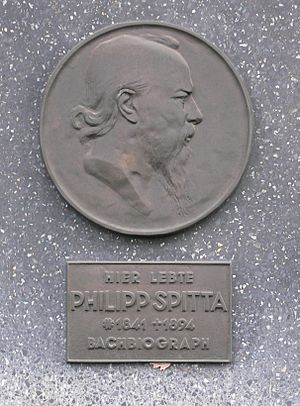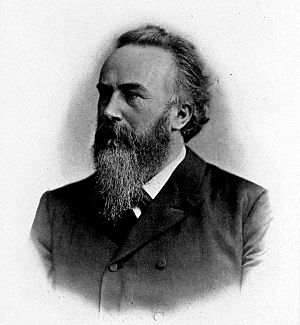Philipp Spitta facts for kids
Philipp Spitta (born December 27, 1841 – died April 13, 1894) was a German expert in music history. He is most famous for writing a book about the life of the famous composer Johann Sebastian Bach in 1873. Spitta was a musicologist, meaning he studied music in a very deep and scientific way.
Contents
Spitta's Early Life and Education
Philipp Spitta was born in Wechold, a town near Hoya. His father, also named Philipp Spitta, was a theologian. A theologian is someone who studies religion. His father also wrote a collection of hymns (religious songs) called Psalter und Harfe.
From a young age, Spitta loved music. He learned to play the piano and the pipe organ. He also learned how to create his own music, which is called musical composition.
In 1860, Spitta went to the University of Göttingen. He studied theology and classical philology. Classical philology is the study of ancient languages like Ancient Greek and Latin language. In 1864, he earned his Ph.D.. His Ph.D. paper was about the ancient Roman writer Tacitus.
While at university, Spitta continued to compose music. He also wrote a book about the composer Robert Schumann. During this time, he became good friends with the famous composer Johannes Brahms.
Teaching and Music Research
After university, Spitta became a teacher. He taught Ancient Greek and Latin. He taught in different cities, including Reval, Sondershausen, and Leipzig.
Even while teaching, he kept up his strong interest in music. He gave talks about music history. He was especially interested in the life and music of Johann Sebastian Bach.
His major book about Bach started to be published in 1873. Because of his important work, he became a professor in 1875. He taught music history at the University of Berlin. He also became a director at the Berlin Hochschule für Musik. He stayed in these important roles for the rest of his life.
Many students learned from him. Some of his notable students included Oskar Fleischer, Max Friedlaender, and Johannes Wolf.
Spitta's Contributions to Musicology

Philipp Spitta had a big impact on the new field of musicology. Musicology is the scientific study of music. He helped create new ways to study music history. This included looking very closely at original sources.
His work covered many different periods of music history. This ranged from the early Middle Ages to his own time. He did research, taught, wrote, and edited musical works. He was very careful and precise in all his studies.
In his famous book about Bach, he wrote the first major study of German choral music and keyboard music from the 1600s. This was an important time for baroque music.
Books Written by Spitta
Spitta wrote many important books and articles. He also wrote articles for Grove's Dictionary of Music and Musicians in 1886. These articles were about composers like Schumann, Spontini, and Weber.
Here are some of his books:
- Ein Lebensbild Robert Schumanns (Leipzig, 1862) – A book about Robert Schumann's life.
- Johann Sebastian Bach (Leipzig, 1873–1880) – His most famous work about Bach.
- Musikalische Werke Friedrichs des Grossen (Leipzig, 1889) – Music by Frederick the Great.
- Zur Musik (Berlin, 1892) – A collection of 16 essays about music.
- Musikgeschichtliche Aufsätze (Berlin, 1894) – A collection of essays on music history.
Musical Editions Edited by Spitta
Spitta also helped edit and publish the works of other composers:
- Dietrich Buxtehude: Orgelwerke (Leipzig, 1876–1877) – Organ works by Buxtehude.
- Heinrich Schütz: Sämtliche Werke (Leipzig, 1885–1894) – Complete works by Schütz.
See also
 In Spanish: Philipp Spitta para niños
In Spanish: Philipp Spitta para niños
 | Valerie Thomas |
 | Frederick McKinley Jones |
 | George Edward Alcorn Jr. |
 | Thomas Mensah |


